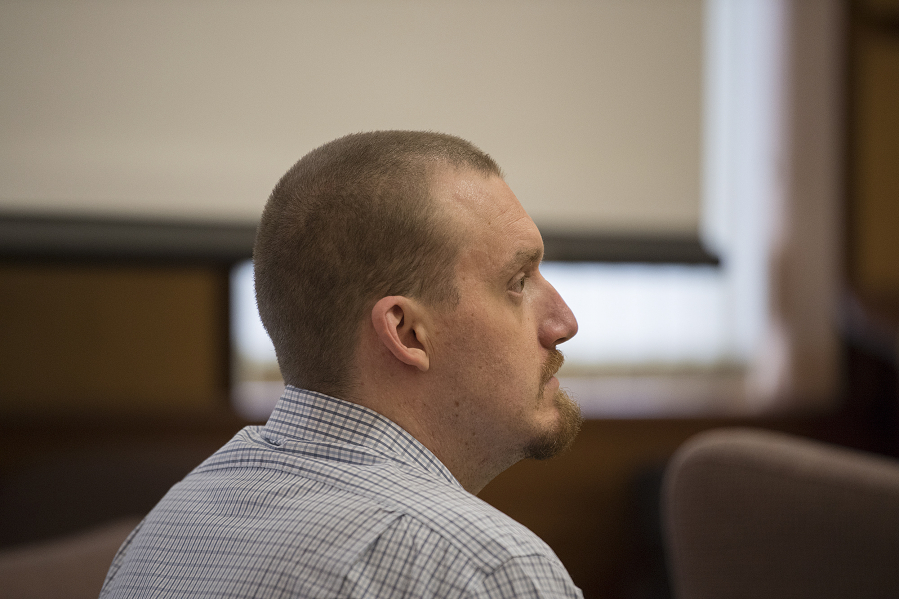A man on trial for allegedly murdering his wife at their Five Corners home in June 2016 took the stand Tuesday and testified that the gun he was handling accidentally discharged.
“It went off,” said Todd R. Marjama Jr., 29, and glanced at jurors. “I saw the muzzle flash and blood gushing from my hand.”
Defense attorney Jeffrey Barrar argued during opening statements last week that Marjama was attempting to decock the gun when it discharged, piercing through the man’s hand and a closed bathroom door before fatally striking Amanda Marjama.
Todd Marjama has been in custody since the day of the shooting, June 28, 2016. His trial began more than a week ago. Sheriff’s deputies, police officers, witnesses, family members and forensic experts have since testified.
Deputy Prosecutor Luka Vitasovic has moved through the trial trying to convince jurors that Todd Marjama intentionally shot and killed Amanda Marjama, the mother of the couple’s three young children. The information filed in the case was amended to include language alleging Marjama may have acted recklessly, but he was still aware his actions could prove deadly.
The defendant answered numerous questions from his attorney and Vitasovic on Tuesday, stating he never intended, even recklessly, to harm his wife.
The morning hours passed as Marjama recounted his military service and his life with Amanda Marjama. He said he joined the military at 19 when his wife suggested they both enlist. She ended up not joining; she was pregnant with their first child.
Barrar spent a fair amount of time questioning Marjama about a dark night in Afghanistan when Marjama and six other soldiers were ambushed while sitting in a mine-resistant vehicle. A rocket pierced the side of the armored truck and struck Marjama in the back of the head, according to testimony. The helmet he’d been wearing split in half. Marjama suffered a traumatic brain injury and torn muscle in his elbow, an injury that required corrective surgery and left him with permanent nerve damage to his left hand.
The injuries led to his eventual discharge from the service. Marjama said he tried to re-enlist, but his superiors decided his military career was over. He was found to be 60 percent disabled, he said. He was diagnosed with PTSD and depression, he said.
When he returned to civilian life, Marjama switched jobs before finding employment in waste management in Sandy, Ore. At the same time, his marriage started deteriorating, which he blamed on a breakdown of communication between himself and Amanda Marjama.
The Marjamas separated but did not get a divorce. Todd Marjama began dating a woman he’d known from his youth and moved in with her. The arrangement later turned volatile. An argument ensued the day Todd Marjama brought his new girlfriend to a country music concert, Marjama said.
His wife’s repeated calls that night were “annoying,” Marjama said.
“I asked her if she wanted to be shot,” he said.
When asked by his attorney, Marjama said he was not serious about the threat. Amanda Marjama forgave him for the remark, and he was back in their home about two weeks later, on the morning of the shooting.
His 7-year-old daughter asked him to drop her off at school, and he stuck around for dinner and to speak with Amanda Marjama about the future of their relationship. He brought along court papers that would dissolve their marriage, but Amanda refused to sign them, Todd Marjama said.
Todd Marjama drank at least three drinks that night while cooking, he said. In the midst of the meal prep, Amanda Marjama’s live-in brother remarked that Amanda had invited another man into the home.
“I remember an emotional rock bottom,” Todd Marjama said. “It was the darkest moment of my life. It was all my fault. I created the issue.”
Marjama said he’d cheated on his wife. He’d moved out and away from the children. He rebuffed Amanda Marjama’s previous efforts to reconcile. He was “mad, sad, depressed,” he said.
In his heightened emotional state, Todd Marjama said, he grabbed his revolver and decided to commit suicide. He announced this to his wife, who, according to Todd, brushed passed him in the living room and entered the home’s master bedroom.
Marjama decided not to end his life, he said. He pursued his wife into the bedroom and was talking to her through the bathroom door, he said. She asked for a moment to collect herself, a response that calmed Todd Marjama.
Here’s what Todd Marjama says happened next: He placed the revolver’s case on the bed. He tried to decock the gun after deciding that putting it into the case primed wasn’t a good idea. Holding the gun in front of his chest, he fumbled and it fired, he said.
The defendant’s memory of what happened following the shooting is unclear, according to testimony. He was arrested and woke up in the hospital, where he was questioned by a detective. Then, he was taken to jail and waited in a booking area overnight.
Barrar elicited details about his client’s level of pain during this time frame, and asked about how much food he’d eaten. Very painful, and only an apple, Marjama said.
It was the second interview with detectives at the Clark County Sheriff’s Office the next morning where Marjama was interrogated about what happened.
“They called me a cold-blooded killer, that my story didn’t make any sense,” Marjama said. “I kept telling them they were wrong.”
“Did you intentionally pull the trigger on that gun?” Barrar asked.
“No,” Marjama said.
“Did you pull the trigger not caring what happened?” the attorney asked.
“No.”
“Was it an accident?”
“Yes.”
Vitasovic repeatedly questioned Marjama about his recollection during his cross-examination. He noted that Marjama told detectives he had fired the revolver 5,000 to 6,000 times over six years of ownership, an amount Marjama admitted he had no reason to doubt.
Marjama testified earlier Tuesday that he’d only decocked the gun once. But Vitasovic read from a transcript that Marjama told detectives he had “decocked it a lot.”
When questioned further, Marjama said the revolver had never misfired or malfunctioned in the past.
The prosecutor stuck on one point more than any other, however. Was the defendant at any point facing the bathroom door Amanda Marjama was standing behind, and did he pull the trigger while standing in that position?
Two sketches of the master bedroom allegedly drawn by Marjama during his interviews with detectives were shown to the jurors. In both drawings, Marjama penned arrows pointing the direction he believed the bullet traveled — east, toward a wall, and not the bathroom.
Marjama said he maintained his recollection that east was the path of the bullet, but he appeared confused by the prosecutor’s questioning.
“I never pointed it intentionally,” Marjama said over and over.
Barrar asked his client to clarify his stance on what happened. Marjama said he had stepped in front of the door, and he was turning away from it when the gun went off. He said when he opened his eyes, he was facing the bed.
“I wasn’t adapting to anything,” Marjama said when asked if he was changing his story based on evidence presented at trial. “That’s what I thought happened.”




